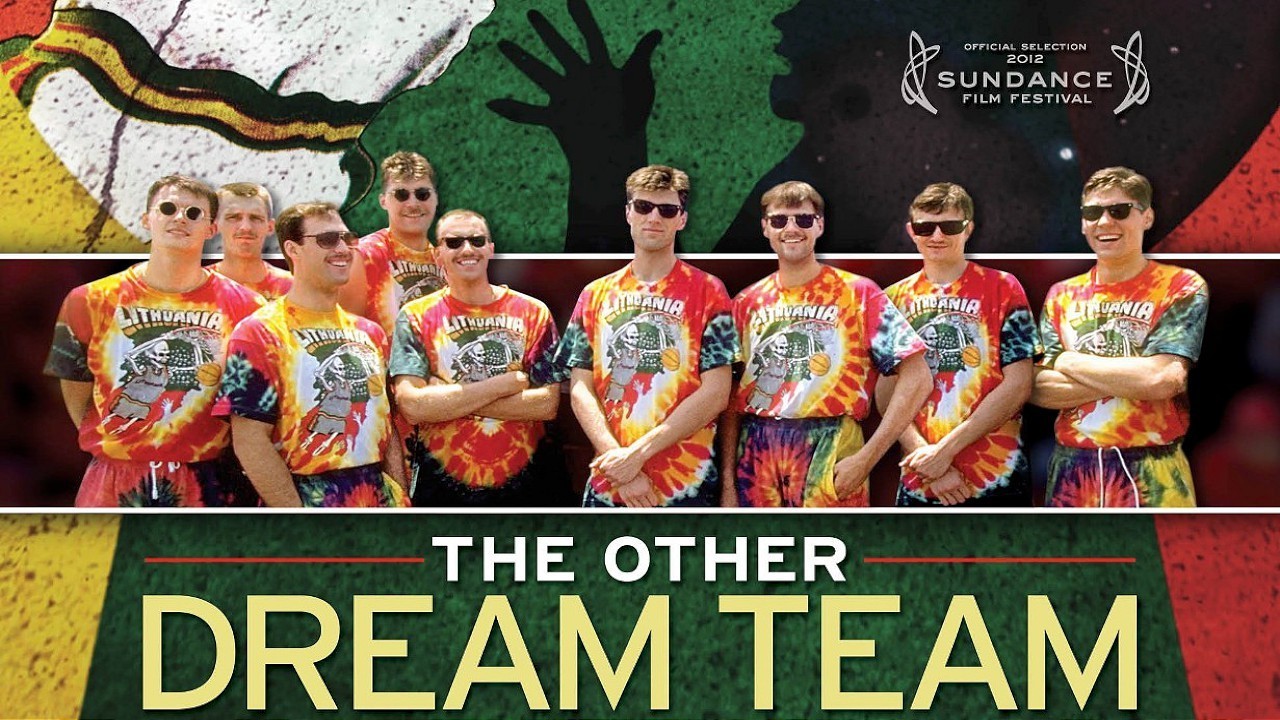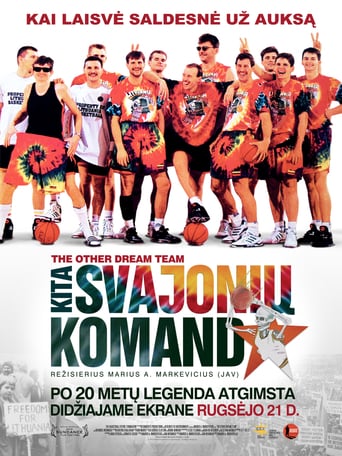

Best movie of this year hands down!
... View MoreWhat a waste of my time!!!
... View MorePerfectly adorable
... View MoreBlistering performances.
... View More"The Other Dream Team" is about Lithuanian basketball from the mid-1980s to today--with a particular emphasis on how this all relates to Lithuanian independence from the old Soviet Union. It seems that this tiny nation was the backbone of the 1988 gold medal basketball team. But what would happen when the USSR fell apart? And, how would this new team help to unify the nation? The film consists of tons of interviews, film clips and photos. Together they tell an inspiring story. In many ways, this is highly reminiscent of another film---one about Lithuania's neighbor, Latvia. In "The Singing Revolution", it talks about this same time period--when these people in a tiny nation stood firm against their Soviet overlords. However, instead of basketball unifying the country, it was their heritage of music. Both are simply terrific films--the sort of well-crafted documentaries that leave you choked up. Great films about freedom and the human spirit.
... View MoreI had the great expectations from this movie and I waited for it very long time. As a basketball and documentary aficionado I have to say that the film is pretty good. Montage, archive footage, interviews, good music...and on top of all it's very touching. However I have one remark. We all know that Lithuania is great basketball country but there was one other with similar path. Shattered small state in independence war. That country is Croatia. It was great rivalry between them and I, as a Croat, think that documentary should have mentioned it. Draen Petrovićs, basketball's Mozart first and last Olympics as a Croat. It is not all about dream teams and US-a. Maybe too much information for average viewer in the beginning but then; the rest will flow. Congratiulations to Lithuania for this national project. One more great sports (and more) documentary.
... View MoreDave Zirin, one of America's most prolific political sportswriter, wrote that "the very passion we invest in sports can transform it from a kind of mindless escape into a site of resistance." With all the pomp and circumstance we afford sports today - the 24-hour cycle of media coverage, greedy ownership, athletic merchandising and advertisements – sports have become merely another cog in today's economic globalization. For the younger generation, it may be hard to fathom that before the Michael Jordans, Lebron James, and Tiger Woods, it was the Muhammad Alis, John Carlos and Tommie Smiths that globalized their respective sports, not through commercial means, but political ones. As an avid sports fan, I find that sports is at its most entertaining when it is infused with some sort of political implication. And anyone who dares to suggest that sports and politics should never coexist is mind-numbingly misinformed. While we still see the cultural and political resonance in international sports today, American sports has been politically starving for quite some time. Consider soccer's international stage, specifically the "El Clasico" matches between Spanish giants Real Madrid and Barcelona. The sport becomes a political means of contestation between divided factions within the nation. Imagine how great the NFL would be if their games had a hint of cultural and political significance. Why don't we encourage and cheer for the defeat of the Arizona Cardinals, a state that encourages racist policies and treatment of immigrants? We do not because this is a testament to how successfully corporate America has shielded us from the everyday concerns of this country. Sport is cheered because it comforts us from real worries. Don't worry about Hurricane Sandy. The New York Knicks and the Miami Heat are playing! The reason I bring this up is because in Marius Markevicius's new film "The Other Dream Team," not only does it reveal how sports became a form of resistance but it is contrasted with the moment when sports was devaluing in American society. "The Other Dream" is a compelling and insightful documentary about the Lithuanian basketball team in the 1992 Olympics in Barcelona, Spain. Before Lithuania was a sovereign nation, it was a tiny nation sandwiched between two oppressive countries, Germany and the Soviet Union. The film chronicles the extent to which the Soviet Union ruled this tiny population with an iron fist. At the center of the film are Sarunas Marculionis and Arvydas Sabonis, the two stars of the Lithuanian basketball team. The former was drafted by the Golden State Warriors and the latter played for the Portland Trailblazers. The film juxtaposes the extreme political conditions in which they lived under with the fact that they played for the USSR. In the '88 Olympics, four Lithuanian players made up the Soviet team and helped lead their oppressive rulers lift the gold. Despite their exceptional talent, the government hindered their progress as they made it difficult for them to play in the NBA. After the end of the Cold War, Lithuania gained its independence. Then with the 1992 Olympics coming up, Lithuania saw a window of opportunity to present themselves in the world's stage. With the funding from the Grateful Dead and sporting totally awesome psychedelic tie-dye shirts, the Lithuanian basketball team played for more than just victory. They played for resistance. They played for identity and nationalism. Although they eventually lost to the Dream Team in the semi-finals, it was the third-place match against the Soviet Union that was pivotal for the nation. Markevicius does a very good job at always focusing on the political aspects of the story. He strays away from the typical norms in sports films. What I love most about the film though is perhaps unintended by the director. While the film is ultimately about the Lithuanian basketball team and how the sport served as a weapon of resistance, it conversely reveals the deterioration of politics in American sports. Although the film hardly focuses on it, the contrast is there. The formulation of America's Dream Team may have some political significance. With the Cold War nearing its end, their need to reclaim the gold from the Soviet Union is very much in the back of their minds. Yet, the dominance of the USA team always remained at a superficial basketball level. They were not playing for nationalization. They played for fame at a global level. I believe this set the trend for basketball, once America's most politically laden sport, to become part of the economic globalization. "The Other Dream Team" is great in that it proves sport is inherently political, even when it is not.
... View MoreAs a casual basketball fan I only some what excited to see this documentary. But The Other Dream Team surpassed all of my expectations. It is a great story of an underdog team that has just want to make their country proud. The film had a lot of work to do to set up the long and complicated history of The Soviet Union and the smaller Eastern European countries, like Lithuania. I really enjoyed hearing the personal accounts of what it was like to grow up during the cold war and what it was like to be on the very strict Soviet Union national basketball team. It is also fun seeing an Olympic experience through the eyes of a country that is not the United States. Many people know the narrative of the 1992 US Basketball 'Dream' Team and this story of the Lithuanian National team only makes that years events more important. There are some amazing photos of the team over the years that were so fun. Especially all of the photos the team in the tye-dye shirts. So fun. I laughed, I cried. It was great.
... View More